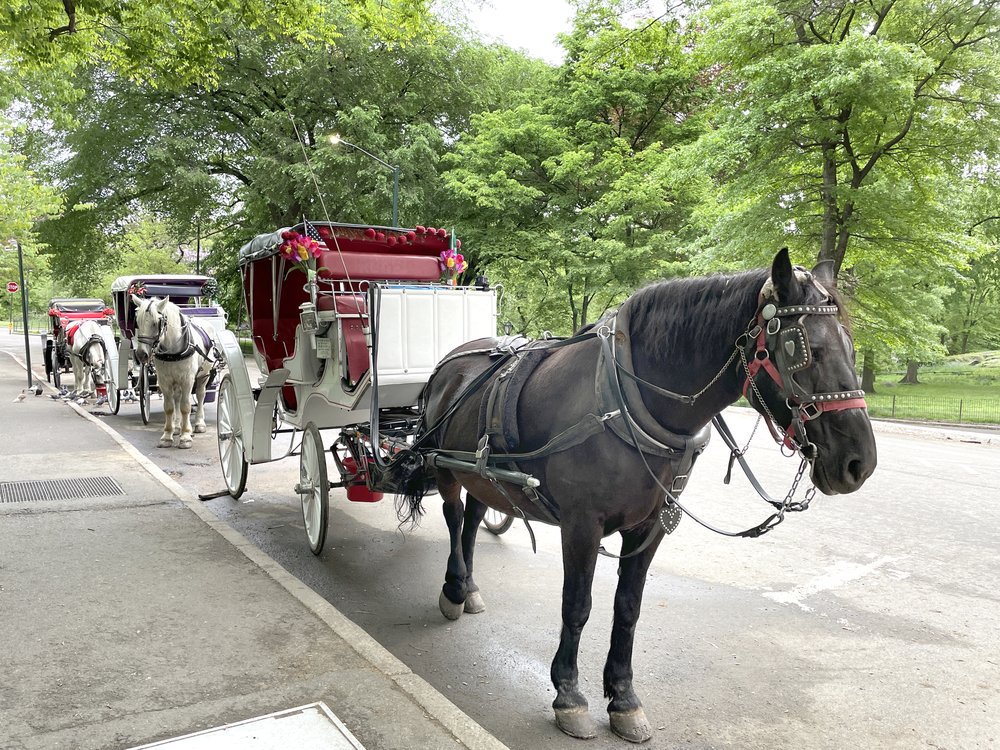Driver of collapsed Central Park carriage horse not guilty of animal abuse, jury decides
July 21, 2025, 2:03 p.m.
Prosecutors charged the driver after his horse collapsed.

A Manhattan jury found a Central Park carriage horse driver not guilty of abusing a horse that collapsed in Midtown on a hot summer day in 2022.
Prosecutors charged Ian McKeever, 56, with a misdemeanor charge of overdriving, torturing and injuring animals. McKeever’s horse, Ryder, fell to the ground while walking toward a stable on Aug. 10, 2022. A crowd watched as the horse struggled to stand, and bystander video of the incident went viral.
After officers from the NYPD’s mounted unit cooled Ryder down with hoses and ice, the horse got back on its feet, prompting cheers from those who had gathered around. But two months later, Ryder was euthanized as his health declined.
The horse’s collapse stoked a debate between critics and supporters of the carriage horse industry. Animal rights activists urged officials to ban carriage horses and investigate possible abuse. The union that represents carriage horse drivers called for reforms to preserve the industry with more training and oversight. About a year after Ryder’s death, Manhattan District Attorney Alvin Bragg charged McKeever in criminal court.
At trial, Assistant District Attorney Taylor Maurer told jurors that McKeever “forced an old and underweight carriage horse named Ryder to ride to the point of collapse” and pushed the horse “too hard.” A woman who was in Central Park that day testified that she saw Ryder walking “really slow” earlier in the day and that something seemed “obviously wrong” with the horse.
But McKeever’s attorney, Raymond Loving, told jurors there was no evidence to prove the overdriving charge. He said McKeever has been driving horses in Central Park for about three decades and is known in the carriage horse community as a “responsible driver who cared deeply about his horses.” Loving also said in his opening statement that McKeever had only started driving Ryder a couple of weeks earlier, after another driver went on vacation.
Prosecutors argued at trial that Ryder collapsed from exhaustion because McKeever ignored warning signs, like panting and trouble walking uphill. The driver’s defense attorney told jurors McKeever thought the horse “seemed perfectly fine.” He argued Ryder tripped while changing lanes and may have been suffering from a neurological disease.
After the verdict was announced Monday, Loving told Gothamist that he and McKeever were “gratified with the verdict.”
“What happened with the horse was heartbreaking. On the way back to the stable, the horse fell,” the defense attorney said. “But the jury heard the evidence, and I think they rightly concluded that there was just simply not a basis to find that Ian abused the horse.”
Bragg said in a statement that his office will continue to investigate and prosecute cases when animals are harmed or mistreated.
“All animals deserve to be treated with the utmost of care,” he said.
The City Council passed a bill in 2019 that prohibits carriage horses from working when it’s 90 degrees or higher outside. Loving said at trial that though it was hot, the temperature was “well within the limits” the day of Ryder’s collapse. A bill that would replace horse-drawn carriages with electric ones — known now as Ryder’s Law — has been pending for years.
Allie Taylor, president of Voters For Animal Rights, said in a statement that New York City’s carriage horse industry “continues to endanger the lives of horses every day.”
“Ryder, an elderly and ill horse, should never have been pulling carriages in the first place. His suffering is a glaring example of what’s wrong with this industry,” she said. “It’s clear: no horse belongs in this outdated, cruel tourist trap. It's time for the City Council to act with compassion and urgency by passing Ryder’s Law and ending the use of horse-drawn carriages in New York City once and for all.”
Christina Hansen, a long-time carriage driver and shop steward for the union, said in a statement that the union has taken several steps since Ryder’s collapse to improve access to medical care for horses and increase oversight of the industry.
“Carriage drivers like me enter this line of work because we love animals, want to spend all day with horses and care deeply about them,” Hansen said. “Animal rights extremists have viciously vilified all carriage drivers, most of whom are immigrants or children of immigrants chasing their American dream. That needs to stop.”
Central Park carriage driver pushed collapsed horse ‘too hard,’ prosecutors say at trial Group calls for cruelty probe into NYC’s horse carriage industry